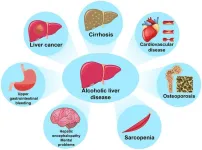(Press-News.org) AMHERST, Mass. – Informal political polls conducted on X/Twitter during both the 2016 and 2020 U.S. presidential elections were significantly skewed by questionable votes, many of which may have been purchased from troll farms. This conclusion, reached by a team of scientists led by Przemyslaw (Przemek) Grabowicz, research assistant professor at the University of Massachusetts Amherst, shows that X/Twitter’s poll system deliberately reports biased public vote counts. On average, the results of such questionable polls favored Donald Trump over Joe Biden, 58% to 42% in a head-to-head comparison, during 2020.
The team additionally found that there were approximately 50% more questionable votes in pre-election polls than in those following the presidential elections, suggesting that skewing social polls is a deliberate tactic to influence political outcomes. In 2024, such biased social polling from X/Twitter was publicly featured by Trump on his social media platform, Truth Social, presumably to create the impression of his overwhelming popularity. These results were published recently in the Journal of Quantitative Description and will be published by the Association for the Advancement of Artificial Intelligence.
“In the 2020 presidential election, there were over 20 million votes cast in more than 100,000 straw polls on X/Twitter,” says Grabowicz. “These polls together had Trump winning a landslide victory, when in reality, Biden won the election. We wanted to take a closer look, to see if the polls were legitimate and what they could tell us about how social media influences American politics.”
This was no small task. “We estimate that there are over 1 million social polls of all kinds on X/Twitter every month,” says Grabowicz. These social polls could ask anything—do you prefer cats or dogs, jazz or heavy metal?—and so the researchers eventually narrowed their results down to purely political polls asking some version of the question, “Who will you vote for?” or “Who will win the election?,” and which listed both Biden and Trump (or Clinton and Trump for the 2016 election) among its candidate options.
What they found was striking.
Social polls consistently predicted a landslide election win for Trump in both the 2016 and 2020 presidential contests. On average, the 2020 social polls had Trump winning by 58%, though he came in at only 46.8% in the presidential election.
Both the 2016 and 2020 social media polls were predominantly crafted by males who had a pronounced bias for Donald Trump. Compared to traditional exit polling conducted on election day, social polls were more than twice as likely to be authored by men than respondents to exit polls. Furthermore, the political ideology of those authoring and responding to social polls skewed right, while those who retweeted and liked social polls were even more likely–by over 10 times–to identify as conservative.
But political identity alone didn’t explain what the research team was seeing. In an international twist, it seemed that Polish politics might.
In 2020, the Polish state media TVP INFO ran a detailed article on the results of an X/Twitter poll it had run asking respondents who had won a Polish presidential debate. What TVP INFO claimed is that out of 35,202 votes, 19,539, or 44.5%, had been bought from troll farms, which are easily locatable with a quick internet search.
“We wanted to know if something similar might be happening in the U.S.,” says Grabowicz.
At issue is a discrepancy in how X/Twitter displays poll votes. There is a public number—that anyone who engages with or votes in the poll can see—but there is also a private number, available only to the poll author. In the case of the TVP INFO’s Polish presidential debate poll, the public figure was nearly 20,000 votes greater than the private number—but the public had no way of knowing this.
In other words, there’s no way for the public to tell the difference between a purchased vote and a legitimate one.
To see if something similar was happening in the U.S., Grabowicz and his colleagues ran their own poll asking respondents whom they would vote for: “Potoo from Arizona, Walrus from Alaska, or Sheep from New York,” and then they purchased votes for their own poll from one of the troll farms.
Once they analyzed all the data, the researchers found that the discrepancies between public and private vote counts closely, though not perfectly, conformed to the number of purchased votes.
“Somehow,” says Grabowicz, “Twitter is taking the purchased votes out of the poll-author’s view, but no one knows how or why.” He is quick to say, though, that without seeing X/Twitter’s own source code and data, he cannot confirm that all questionable votes are purchased votes.
The researchers also surveyed 984 authors of 2020 X/Twitter social polls, asking to see their private vote count. While only a handful responded, the results were consistent across all the studied polls. Strikingly, there were about 50% more questionable votes before the 2020 presidential election than afterward, suggesting that social poll manipulation is a deliberate tactic to skew voter perception of public opinion.
And finally, some of the questionable pre-election social polls predicting a Trump landslide were used to reinforce voter-fraud beliefs once the actual election results came in. Trump himself recently shared on Truth Social a screenshot of a biased current poll conducted on X suggesting that 70.1% of voters supported him.
According to social polls published this year on X/Twitter, Trump leads in the 2024 horse race, winning an average 72% of votes in contrast to Biden’s 28%. Grabowicz and his team have developed a website, socialpolls.org, that will be updated daily, to track such polls and correct their biases.
“Our work cautions that social media platforms lack transparency, even for things as important as national elections,” says Grabowicz. “If it’s happening in that context, then you can be sure that it’s happening in many others, as well.”
A media kit, with images and all caption and credit information, is available here.
Contacts: Przemek Grabowicz, grabowicz@cs.umass.edu
Daegan Miller, drmiller@umass.edu
END
Social media polls deliberately skew political realities of 2016, 2020 US presidential elections, finds research team led by UMass Amherst
Questionable voting, including vote purchasing, rife on X/Twitter, contributed to inaccurate impression of Trump’s electoral performance
2024-07-16
ELSE PRESS RELEASES FROM THIS DATE:
Unique characteristics of previously unexplored protein discovered
2024-07-16
An international research collaboration, led by Prof. Dr. Robert Grosse (Centre for Integrative Biological Signalling Studies and Institute of Clinical and Experimental Pharmacology and Toxicology, University of Freiburg), Dr. Libor Macurek (Institute of Molecular Genetics, Czech Academy of Sciences, Prague) and Dr. Zdenek Lansky (Institute of Biotechnology, Czech Academy of Sciences, Prague) has uncovered a new mechanism of the crosstalk between microtubules and actin cytoskeleton during cell division and ...
Alcoholic liver disease in China: A disease influenced by complex social factors that should not be neglected
2024-07-16
Alcoholic liver disease (ALD) is a major cause of liver-related morbidity and mortality globally. Chronic alcohol consumption, a primary driver of ALD, leads to a spectrum of liver conditions ranging from fatty liver to cirrhosis and hepatocellular carcinoma. In China, the incidence of ALD has been rising at an alarming rate, reflecting the country's rapid economic growth and changing social norms around alcohol consumption. This paper explores the complex social factors influencing ALD in China, the complications ...
Foreign direct investments may fuel tropical deforestation
2024-07-16
Foreign direct investments (FDI) in tropical countries in extractive industries like mining, logging and fossil fuels have a long, environmentally destructive track record in tropical countries. Are FDI in food systems another extractive industry?
Highlights:
Foreign direct investment (FDI) in food systems are a major contributor to deforestation in tropical countries, an advanced machine learning model shows
Laws requiring deforestation-free exports are welcome but likely address only a fraction of forest loss potentially linked to FDI in food systems in domestic markets
Better regulation of FDI in domestic food production is needed to save more forest ...
Timing is everything: Study finds link between bowel movement frequency and overall health
2024-07-16
SEATTLE – Everybody poops, but not every day. New research by the Institute for Systems Biology (ISB) suggests bowel movement frequency is linked to long-term health.
An ISB-led research team examined the clinical, lifestyle, and multi-omic data of more than 1,400 healthy adults. How often people poop, they found, can have a large influence on one’s physiology and health. Their findings will be published in the Cell Reports Medicine on July 16.
Researchers explored data from consenting participants of the consumer wellness company Arivale. The ...
Hormone therapy for breast cancer linked with lower dementia risk
2024-07-16
Hormone modulating therapy (HMT) used for the treatment of breast cancer was associated with a 7% lower risk of developing Alzheimer’s disease and related dementias later in life, according to a new study published today in JAMA Network Open.
The study, which is one of the largest of its kind, found that although HMT was linked with protection against the development of dementia overall, the association decreased with age and varied by race.
“Our findings emphasize the importance of being cognizant of individual patient factors when we prescribe medications or develop treatment plans for breast cancer,” said senior author Francesmary Modugno, Ph.D. M.P.H., ...
Alzheimer disease and related dementia following hormone-modulating therapy in patients with breast cancer
2024-07-16
About The Study: In this retrospective cohort study, hormone therapy was associated with protection against Alzheimer disease and related dementias in women age 65 or older with newly diagnosed breast cancer; the decrease in risk was relatively greater for Black women and women under age 75, while the protective effect of hormone-modulating therapy (HMT) diminished with age and varied by race in women. When deciding to use HMT for breast cancer in women age 65 years or more, clinicians should consider age, self-identified race, and HMT type in treatment decisions.
Corresponding ...
AI tool successfully responds to patient questions in electronic health record
2024-07-16
As part of a nationwide trend, many more of NYU Langone Health’s patients during the pandemic started using electronic health record tools to ask their doctors questions, refill prescriptions, and review test results. Many patients’ digital inquiries arrived via a communications tool called In Basket, which is built into NYU Langone’s electronic health record (EHR) system, EPIC.
While physicians have always dedicated time to managing EHR messages, they saw a more than 30% annual increase in recent years in the number of messages received daily, according an article by ...
New analysis of Cassini data yields insights into Titan’s seas
2024-07-16
UNDER EMBARGO UNTIL JULY 16, 2024, AT 11:00 AM ET
ITHACA, N.Y. – A new study of radar experiment data from the Cassini-Huygens mission to Saturn has yielded fresh insights related to the makeup and activity of the liquid hydrocarbon seas near the north pole of Titan, the largest of Saturn’s 146 known moons.
The key takeaway: Using data from several bistatic radar experiments, a Cornell University-led research team was able to separately analyze and estimate the composition and roughness of Titan’s sea surfaces, something previous analyses of monostatic radar data were unable to achieve. This will help pave the way for future combined ...
New sleep study aims to understand cognitive decline in women
2024-07-16
LA JOLLA, CA—Alzheimer’s disease, the most common type of dementia, currently affects twice as many women as men, with minority populations predicted to witness the most significant increase in cases in the coming years, according to the Centers for Disease Control and Prevention.
Disturbances in sleep are well-known in dementia but have previously been explained as an outcome of the disease, not the cause. Increasing evidence, however, now implicates sleep disturbances with the development of dementia.
In a bid to better understand the relationship between sleep and cognitive outcomes in women, scientists at the Scripps ...
Turning agricultural trash to treasure
2024-07-16
In California's Northern San Joaquin Valley, agricultural leftovers such as almond shells, fruit peels, and orchard trimmings can potentially be converted into sustainable bioproducts and biofuels – with the right technology. Today, Schmidt Sciences’ Virtual Institute on Feedstocks of the Future awarded new funding to a group investigating how to make better use of the diverse agricultural waste in the region.
The group, “Building the Circular Bioeconomy in the North San Joaquin Valley” or BioCircular Valley, is co-led by the Department of Energy’s Lawrence Berkeley National Laboratory (Berkeley Lab), UC Berkeley, and BEAM Circular, ...
LAST 30 PRESS RELEASES:
Learning makes brain cells work together, not apart
Engineers improve infrared devices using century-old materials
Physicists mathematically create the first ‘ideal glass’
Microbe exposure may not protect against developing allergic disease
Forest damage in Europe to rise by around 20% by 2100 even if warming is limited to 2°C
Rapid population growth helped koala’s recovery from severe genetic bottleneck
CAR-expressing astrocytes target and clear amyloid-β in mouse model of Alzheimer’s disease
Unique Rubisco subunit boosts carbon assimilation in land plants
Climate change will drive increasing forest disturbances across Europe throughout the next century
Enhanced brain cells clear away dementia-related proteins
This odd little plant could help turbocharge crop yields
Flipped chromosomal segments drive natural selection
Whole-genome study of koalas transforms how we understand genetic risk in endangered species
Worcester Polytechnic Institute identifies new tool for predicting Alzheimer’s disease
HSS studies highlight advantages of osseointegration for people with an amputation
Buck Institute launches Healthspan Horizons to turn long-term health data into Actionable healthspan insights
University of Ottawa Heart Institute, the University of Ottawa and McGill University launch ARCHIMEDES to advance health research in Canada
The world’s largest brain research prize awarded for groundbreaking discoveries on how we sense touch and pain
Magnetofluids help to overcome challenges in left atrial appendage occlusion
Brain-clearing cells offer clues to slowing Alzheimer’s disease progression
mRNA therapy restores fertility in genetically infertile mice
Cloaked stem cells evade immune rejection in mice, pointing to a potential universal donor cell line
Growth in telemedicine has not improved mental health care access in rural areas, study finds
Pitt scientists engineer “living eye drop” to support corneal healing
Outcomes of older adults with advanced cancer who prefer quality of life vs prolonging survival
Lower music volume levels in fitness class and perceived exercise intensity
Of crocodiles, counting and conferences
AERA announces 2026 award winners in education research
Saving two lives with one fruit drop
Photonic chips advance real-time learning in spiking neural systems
[Press-News.org] Social media polls deliberately skew political realities of 2016, 2020 US presidential elections, finds research team led by UMass AmherstQuestionable voting, including vote purchasing, rife on X/Twitter, contributed to inaccurate impression of Trump’s electoral performance





